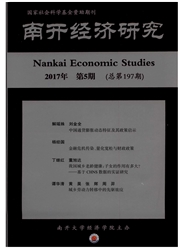

 中文摘要:
中文摘要:
既有文献对中国劳动收入份额下降成因的解释集中在产业结构变动、技术进步、全球化、二元经济体制以及财政效应等方面,本文则从人口年龄结构视角提供一种新的解释。通过一个理论模型表明,人口年龄结构变化将影响个体的储蓄行为,进而影响生产的资本集约程度;在资本和劳动存在替代关系的情形下,资本集约程度将降低劳动收入份额。利用1990—2007年间省际数据的经验研究,确认了老年抚养比上升和少儿抚养比下降是解释我国劳动收入份额下降的重要因素,即便控制其他潜在的影响劳动收入份额的各种因素后,上述结论仍是显著且稳健的。
 英文摘要:
英文摘要:
This paper tries to give a new explanation, from population age stracture per- spective to deceasing labor income share in current China. Our explanation is different from the ideas in existing literatures, which focus on the role of industrial structure; change, technological progress, globalization, dual economic system, and the fiscat effect. A theoretical model is developed to show that, change of population age structure may affect the individuals' saving behavior, and thus affect capital intensity, which can naake labor income share lower when there is a substitute relation between labor and capital. Empirical investigation is conducted with a panel data set of 29 provinces from 1990 to 2013,7, and the results confirm that, increasing old dependency and decreasing children dependency are significant factors for decreasing labor income share, even other potential important factors are controlled.
 同期刊论文项目
同期刊论文项目
 同项目期刊论文
同项目期刊论文
 期刊信息
期刊信息
